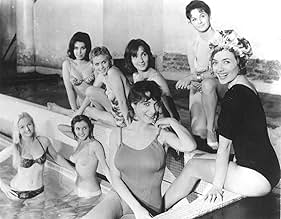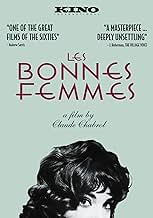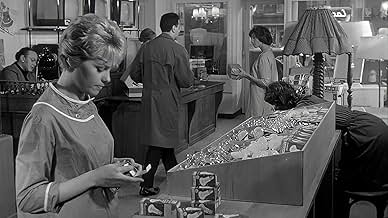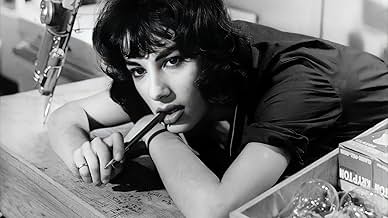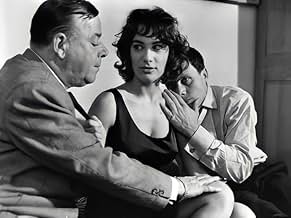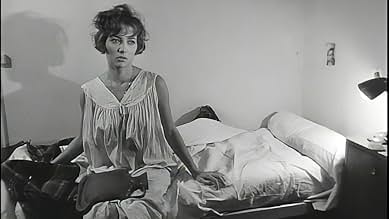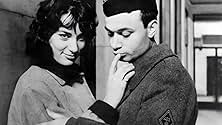CALIFICACIÓN DE IMDb
7.2/10
3.3 k
TU CALIFICACIÓN
Agrega una trama en tu idiomaFour Parisian women navigate the world of romance and daily life looking to fulfill their dreams but often find real-life to be inescapable.Four Parisian women navigate the world of romance and daily life looking to fulfill their dreams but often find real-life to be inescapable.Four Parisian women navigate the world of romance and daily life looking to fulfill their dreams but often find real-life to be inescapable.
- Dirección
- Guionistas
- Elenco
- Premios
- 1 nominación en total
Gabriel Gobin
- Le père d'Henri
- (as Gabriel Gobain)
- Dirección
- Guionistas
- Todo el elenco y el equipo
- Producción, taquilla y más en IMDbPro
Opiniones destacadas
The film shows a weekend in the lives of four Parisian shop girls, from their Friday night out in the nightclubs of Paris through to a Sunday outing into the countryside. All four dream of escaping their humdrum existence: Ginette (Stephane Audran) is trying to start an alternative career as a music hall singer, Rita (Lucile Saint-Simon) is engaged to a shop owner, Jane (Bernadette Lafont) is wined and dined by two married businessmen, and Jacqueline (Clothilde Joano) falls in love with a biker who is stalking her. The monotony of the girls' lives is shown as they spend Saturday in the shop just waiting for the moment when they can go home. At the same time Chabrol shows a fascinating portrait of the city at work and at play. The storyline holds the viewer's interest, the acting is excellent (especially Lafont, and despite some terrible overacting from the girl's boss), and the director hints at some of the gruesome shocks of his later films.
In Paris, Jane (Bernadette Lafont) and her colleague and roommate Jacqueline (Clotilde Joano) are walking home when the friends Marcel (Jean-Louis Maury) and Albert (Albert Dinan) hit on them and invited them to go to a restaurant. Later, Jacqueline goes home while Jane goes to Albert's apartment and has a threesome. On the next morning, they go to the appliance store Maison Belin where they work with Ginette (Stéphane Audran), Rita (Lucile Saint-Simon) and the spinster Mme Louise (Ave Ninchi), who is the cashier. The owner Monsieur Belin (Pierre Bertin) is an abusive boss, and they hate their work. Jane has a boyfriend but is a promiscuous party girl. Ginette has a secret life at night, singing in a music hall. Rita has a bourgeois fiancé, Henri (Sacha Briquet), who does not respect her and believes she is empty. Jacqueline is naive and believes in love, and when a biker follows her everywhere with his motorcycle, she believes he is her shy prince charming. When Jacqueline meets him at a public swimming pool, they introduce themselves to each other and the biker Ernest Lapierre (Mario David) dates her. They go to a remote restaurant in the countryside, and he asks her why she dated him without knowing him. But soon Jacqueline learns who he is.
"Les bonnes femmes" (1960), a.k.a. "The Good Time Girls", is the fourth film by Claude Chabrol disclosing the dull life of four young working-class women in the job at an appliance store. Their moments of joy are after hours, each one with a lifestyle. Jane is a promiscuous woman; Rita does not have self-respect; Ginette likes to sing in a music hall; and Jacqueline, who seems to be the youngest, is a dreamer. In common, they are treated like objects. It is funny to see how silly some men like Marcel and Albert were in those years in Paris. The conclusion is a great surprise from Chabrol. My vote is seven.
Title (Brazil): "Mulheres Fáceis" ("Easy Women")
"Les bonnes femmes" (1960), a.k.a. "The Good Time Girls", is the fourth film by Claude Chabrol disclosing the dull life of four young working-class women in the job at an appliance store. Their moments of joy are after hours, each one with a lifestyle. Jane is a promiscuous woman; Rita does not have self-respect; Ginette likes to sing in a music hall; and Jacqueline, who seems to be the youngest, is a dreamer. In common, they are treated like objects. It is funny to see how silly some men like Marcel and Albert were in those years in Paris. The conclusion is a great surprise from Chabrol. My vote is seven.
Title (Brazil): "Mulheres Fáceis" ("Easy Women")
The film's English title "The Good Time Girls" capture the essence of the film--four different women, working in a shop, moonlighting as they are not rich, and hoping to find a decent spouse. The shop itself presents the lecherous owner (who "keeps his distance") and an elderly cashier who hides her interest in BDSM (her fetish is a cloth dipped in the blood of a BDSM convict who was guillotined, with an insinuated relationship with a customer who asks her for money and gets it!), a beautiful Stephane Audran (moonlighting as a singer), and the attractive Clotilde Joano. And there is a murder, which hangs in the air without the outcome discussed further--one of the weak points of the over-rated film.
Les bonnes femmes (1960), directed by Claude Chabrol, was shown in the U.S. with the title The Good Time Girls. The film depicts the lives of four Parisian shopgirls. (I guess now we would call them retail clerks, but in 1960 they were shopgirls.)
The women are all looking for romance, and they do no one any harm, but their lives are not filled with the glamor and excitement that the term "good time girls" evokes. They go to music halls, public swimming pools, and the zoo. They let men cruising by in cars pick them up. They stay out all night and stumble half asleep into work the next day. One of them is pursued and courted by a mysterious motorcyclist.
All four young women are attractive. Three of them went on to have important careers in the French cinema--Bernadette Lafont , Clotilde Joano, and Stéphane Audran. (Audran later married director Chabrol,)
Although Chabrol is a superb director, and the actors are talented, the film just didn't work for me. The young women had vacant lives, they had no aspirations or dreams of something different, and they had a naiveté that was sad rather than charming.
This is a movie worth seeing if you have a particular interest in the French New Wave, in Claude Chabrol, or in the young actors who were not yet major stars. I wouldn't seek it out as casual viewing. We saw it on VHS, and it worked well on the small screen.
The women are all looking for romance, and they do no one any harm, but their lives are not filled with the glamor and excitement that the term "good time girls" evokes. They go to music halls, public swimming pools, and the zoo. They let men cruising by in cars pick them up. They stay out all night and stumble half asleep into work the next day. One of them is pursued and courted by a mysterious motorcyclist.
All four young women are attractive. Three of them went on to have important careers in the French cinema--Bernadette Lafont , Clotilde Joano, and Stéphane Audran. (Audran later married director Chabrol,)
Although Chabrol is a superb director, and the actors are talented, the film just didn't work for me. The young women had vacant lives, they had no aspirations or dreams of something different, and they had a naiveté that was sad rather than charming.
This is a movie worth seeing if you have a particular interest in the French New Wave, in Claude Chabrol, or in the young actors who were not yet major stars. I wouldn't seek it out as casual viewing. We saw it on VHS, and it worked well on the small screen.
10Aw-komon
The 'overacting of the boss' mentioned in the previous comment is totally intentional! Chabrol is playing around with genres here, exaggerating for effect. He straddles the fence between comedy and tragedy for the entire film, veering this way and that whenever it serves his purpose: to paint an allegory of absurd modern existence through the soul of modern young females. The surreal modern music at the beginning clues you in, and the awesome final scene with the empty, tragic eyes of the girl finding her only happiness when a man asks her to dance brings it all together beautifully. Man! what a great film! I didn't want to leave the theater after watching it twice in a row, but I was too tired. As disappointing as Chabrol's films have been to me over the years, this one was a jackhammer of a surprise. The Hitchcock elements are there but they don't dominate and straitjacket everything else. On a level with "Breathless," "Shoot the Piano Player," yet completely unlike either of them, this film defines the "New Wave" aesthetic, which to this day, some forty years later provides a standard for Tarantino types to strive for. Films like these can only be directed by masters who have the nerve and audacity to bend genres to their whim and speak their ultimate truth through the nature of the medium itself.
¿Sabías que…?
- TriviaCaused so much resentment among the public upon its release that some went as far as breaking seats in theaters as sign of protest.
- ErroresAfter Ernest strangles Jacqueline, he rips his coat out from under her and flips her over. The supposedly dead Jacqueline immediately moves her arm to catch herself from going face first into the mud.
- Citas
Monsieur Belin: My pleasure in life is to reprimand little girls... It's my prerogative.
- ConexionesFeatured in Le fils de Gascogne (1995)
Selecciones populares
Inicia sesión para calificar y agrega a la lista de videos para obtener recomendaciones personalizadas
- How long is The Good Girls?Con tecnología de Alexa
Detalles
Taquilla
- Total en EE. UU. y Canadá
- USD 6,578
- Fin de semana de estreno en EE. UU. y Canadá
- USD 6,578
- 15 ago 1999
- Tiempo de ejecución1 hora 40 minutos
- Color
- Relación de aspecto
- 1.66 : 1
Contribuir a esta página
Sugiere una edición o agrega el contenido que falta

Principales brechas de datos
By what name was Les bonnes femmes (1960) officially released in India in English?
Responda
